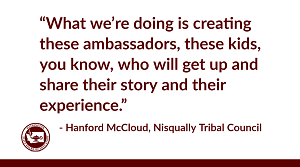Release Date:
Recently, SBE hosted leaders in Native education for an in-depth panel discussion on compact schools, inclusivity, partnerships, and more. The panel was facilitated by Bill Kallappa (SBE Board member) and Makah tribal member.

At Davalos’ school, robust language and culture courses are offered that showcase tribal leaders as experts in culture.
“Our culture in history program at our school is staffed all by Suquamish tribal members. They didn't go to the UW, they didn't go get a masters or doctorate,” said Davalos, “Their masters or doctorate is in knowledge of the tribe and all those things to them that are traditional…the flexibility that compacting affords you means you can focus on language, culture and history of your tribe.”
Among a robust cultural curriculum, students at Chief Kitsap can practice and share important traditions with all Washingtonians.
“The traditional things that we get to do are remarkable as far as language. Lushootsee is required…our song and dance group probably has fifty kids in it of the ninety that go to our school. They're asked to perform all over the state for various functions.”
Speaking to the current state of education, leaders such as Office of Native Education Director, Jon Claymore, shared about the importance of family engagement in a COVID-19 world, saying, “We want to hear the parents. We want to knock down those barriers that might get in the way to make sure we’re hearing those concerns in remote situations.”
He also noted the need to recognize strengths in each student, and to have clear goals for all kids based on their passions—leaving no student behind, especially today. Claymore shared data about Native American students’ drop-out rate and is hopeful the pandemic will not stall progress in decreasing those cases.
“There’s no such thing as a throw-away kid. Every kid has a skill and it is up to us to make sure we’re identifying those skills…and to make sure kids are meeting their goals and fulfilling their dreams,” said Claymore.
Moments of the panel with great impact involved personal stories from leaders like Nisqually Tribal Council member and long-time Native education advocate, Hanford McCloud.
McCloud spoke to an example from North Thurston Public Schools, in which Native American flags are flown at all the district’s schools.
“I have a foster kid, she’s eight. She goes to North Thurston. When she goes in to pick up her school supplies, she sees that Nisqually flag, and she’s just ecstatic. When kids see that, they have that pride factor. That’s just the connection and sharing that. What we're doing is creating these ambassadors, these kids, you know, who will get up and share their story and their experience,” McCloud shared.
Jarad Koepp, Native Student Program Specialist for North Thurston Public Schools, was part of the panel and went into more detail about the district’s thinking behind partnerships and inclusivity.
“The history is that public education was something that was done to us and not for us,” said Koepp. “To have, land acknowledgement, have the community involved in your schools, to have your teachers learning from tribal members, it increases the visibility, it increases the genuine partnership and the recognition and the fact that this is a truly safe and inclusive community.”
All panelists, including Koepp, spoke about the future and what needs to happen to secure a long-lasting inclusive educational landscape.
Friend and relative of Hanford McCloud, and fellow Nisqually Tribal Council member, Willie Frank III, is part of a long legacy of Native American advocacy in Washington State. He shared the panelists views on the importance of recognizing student heritage and thinking forward to the next set of tribal leaders in years to come.
“The education we see here at the tribe for our next leaders, our next generation—it’s so important, it’s so valuable to make sure that our kids are getting through high school and getting to college or trade school or whatever else they want out of life.”
Find out more about the panelists’ backgrounds in a previous SBE blog post and check out the recording of the panel on Zoom. Special thanks to all panelists for sharing their views!
Related resources:
• Since Time Immemorial Tribal Sovereignty in Washington State (curriculum)
• Washington State Tribal Compact Schools
• Chief Kitsap Academy
• North Thurston Public Schools Tribal Partnerships

